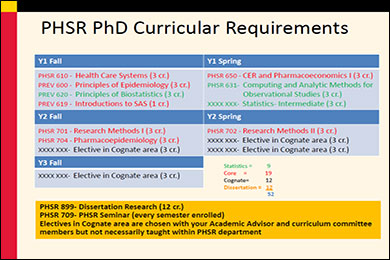There are minimum requirements each student must meet to receive a doctoral degree in Pharmaceutical Health Services Research (PHSR).
Individual students might be required to take additional courses as deemed appropriate by their curriculum committee. In particular, students without strong computer programming skills may need elective courses.
Required courses include a group of core graduate courses in pharmaceutical health services research, research methods, and statistics. Then, the student must complete at least 12 credits of advanced courses in their research track beyond any core courses. It generally takes two to two and one half years to complete the core and advanced course requirements.
While many students come to us with prior graduate work, we do require that they take the core courses here. When non-core courses or the beginning/intermediate statistics requirements are waived, students are expected to take more advanced courses to complete the course requirements. To allow flexibility and to ensure that students are well prepared in their area of specialization, students are asked to establish a curriculum committee by the end of their first year of study.
To graduate, students must complete at a minimum:
Required Core Curriculum (35 credits)
- PHSR 610 Health Care Systems (3 credits)
- PHSR 620 Introduction to Health Behavior Theory (3 credits)
- PHSR 650 CER & Pharmacoeconomics I (3 credits)
- PHSR 701 Research Methods I (3 credits)
- PHSR 702 Research Methods II (3 credits)
- PHSR 704 Pharmacoepidemiology (3 credits)
- PHSR 709 Seminar (4 credits)
- PREV 600 Principles of Epidemiology (3 credits)
- PREV 619 Introduction to SAS (1 credit)
- PREV 620 Introduction to Biostatistics (3 credits)
- Statistics Various (9 credits)
Advanced Cognate Coursework
- Electives Determined by student and Curriculum Committee (12 credits)
- PHSR 899 Dissertation Research (12 credits)
Please visit this webpage for information about curricular requirements for the dual degree program.

